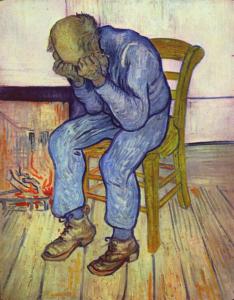
Forgive me what might seem a non-sequitur. As a kid, I’d always greet the new year with my grandmother; we’d watch the Honeymooners and bang pots and pans. Above all, though, we’d watch the annual Twilight Zone marathon. It being about the new year, I was interested to hear from a friend about an episode I can’t recall ever seeing before: “What You Need.” I’ve always loved the show, so I went home and watched this particular, unseen 25-minutes of television.
It really stuck with me. By profession, I guess you could say I’m a literary critic; it’s basically my job to make sense of texts, and these days “texts” is often taken in a broad sense: books, films, TV shows, songs. This episode seemed to me to have a lot to say about human desire and how it works. Of course there are many ways of going about interpretation. I don’t claim mine is any more “correct” than any other, but, as St. Bernard approached the Song of Songs and Lacan approached Poe, I’d like to approach The Twilight Zone and see what something confounding or seemingly-mundane might have to say about the nature of our desire.
We’re presented with two main characters: a laugh-less, luck-less man by the name of Fred Renard and an old peddler called Pedott. Mr. Renard walks into a bar and sits down, telling the bartender to scram when he asks him to have another drink or get lost. Rod Serling’s opening narration makes clear what sort of man we’re dealing with:
You’re looking at Mr. Fred Renard, who carries on his shoulder a chip the size of the national debt. This is a sour man, a friendless man, a lonely man, a grasping, compulsive, nervous man. This is a man who has lived thirty-six undistinguished, meaningless, pointless, failure-laden years and who at this moment looks for an escape—any escape, any way, anything, anybody—to get out of the rut. And this little old man is just what Mr. Renard is waiting for. (IMDb)
He’s “grasping, compulsive, nervous,” living a “meaningless, pointless, failure-laden” life. The question is what Mr. Renard needs, what could possibly break his cycle of worthless action, scraping by and yapping at anyone who so much as looks him in the eye. Pedott walks into the bar with a suitcase filled with knickknacks. A young woman asks for matches, and, declining her money, he tells her she really needs a bottle of stain remover. Next the old man moves on to Lefty, an ex-pitcher with a bum arm. He hands him a bus ticket to Scranton, Pennsylvania. Lefty is bewildered until moments later he’s told there’s a call for him; a former manager of his has asked him to come and coach a minor-league team. Where? Scranton, Pennsylvania. Lefty wishes he had a clean jacket for his upcoming interview. Of course, it’s at that moment that the young woman from before comes over with her bottle of stain remover.
This gets Mr. Renard’s attention. He shakes Pedott down outside the bar, desperately asking him what it is he really needs. He gets scissors, and, lo and behold, as he takes an elevator later that night, his scarf (wrapped tightly around his neck) gets stuck in the machine’s doors as it goes down. He has to cut it off to avoid choking to death. The scissors do just the trick.
Pedott comes home that same night to find Renard sitting in his living room. The peddler enquires after why he’s come, what he wants. His goods can’t offer satisfaction. Renard reveals that he knows this old man must have some sort of gift, some ability to see into people’s futures. He says there’s only one thing that satisfies him: luxury, and he wants Pedott to help him get it. Threatening the old man once again, he’s given a leaky pen. Bewildered at first, he soon finds that it’s dripping onto the newspaper, specifically onto the name of a horse in tomorrow’s race. Needless to say, Renard bets on that horse and it wins.
The next day he finds the pen in good condition; it won’t leak anymore. Angry, he heads over to see Pedott, who insists that he cannot give Renard what he needs: tranquility, contentment, patience, peace of mind. Searching through the peddler’s suitcase, he finds a box with leather-soled shoes inside. Renard puts them on, but has no idea what to do. Feeling gypped, he prepares to run after the old man, only to slip on the wet street and get hit by a car. Pedott looks on sadly, saying that he only ever saw death in Renard’s eyes. In truth, the shoes were what this kindly peddler needed, since, if Renard had not died, he would’ve killed him.
In the final scene, a couple comes out of their house and asks the old man what happened. He tells them about the hit-and-run and hands the man a comb, saying it’s what he needs. They think Pedott is insane, until a reporter runs up to take their picture for the next day’s newspaper column about the accident. The man takes out the comb and tames his messy, nighttime hair. It was, in fact, what he needed.













